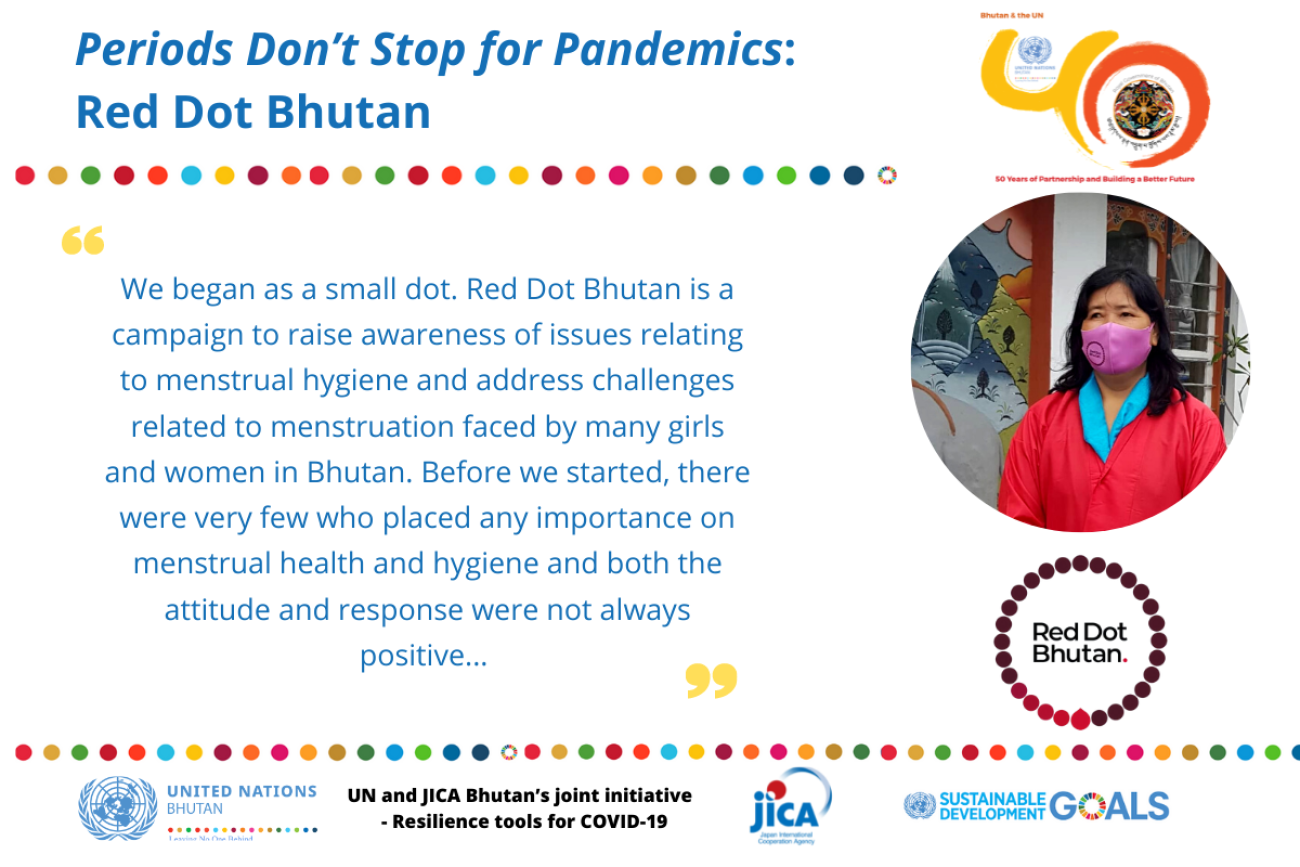Periods Don’t Stop for Pandemics: Red Dot Bhutan

We Care, We Share
UN and JICA Bhutan’s joint initiative - Resilience tools for COVID-19
A couple of years ago, Tika remembers asking for a black plastic bag whenever she bought sanitary pads. Often, Tika would avoid male shopkeepers when she needed to buy pads, and would murmur quietly to the shopkeepers to ask whether they sold pads or not. Most shopkeepers would voluntarily wrap sanitary pads in newspapers and sell them to customers, an unsolicited and automatic gesture they practiced.
Every year around the world, the 28th May is observed as Menstrual Hygiene Day with the day first observed in 2015 in Bhutan. What started out as only a day of awareness, gathered momentum and later transformed into Red Dot Day Bhutan after three years. Red Dot Bhutan was initiated in 2018 by the School Health and Nutrition Division (SHND), Department of School Education under the Ministry of Education. With limited advocacy and proper knowledge on menstruation and Menstrual Hygiene Management (MHM) especially in schools, such issues in the past were largely hidden and unspoken leading to what is called ‘period poverty’ in communities where there are poor menstrual facilities and finite access to menstrual products.
“We began as a small dot. Red Dot Bhutan is a campaign to raise awareness of issues relating to menstrual hygiene and address challenges related to menstruation faced by many girls and women in Bhutan. Before we started, there were very few who placed any importance on menstrual health and hygiene and both the attitude and response were not always positive. Particularly in schools where young girls missed their classes and other opportunities,” says Deki Tshering, who has been part of the Red Dot journey since its inception and is currently the lead focal for the campaign at the Ministry of Education.
In more recent years, menstrual health and hygiene was brought under the Ministry’s WASH (Water, Sanitation and Hygiene) initiative, which focuses on providing proper toilet facilities and clean access to water in schools across the country. Sanitary pads and soap were widely distributed in schools and nunneries and there were advocacy and training programs on menstrual health and hygiene held in various schools where school-teachers, health coordinators and parents took part.
“We have come a long way. Now-days people are more open when they talk about menstruation, even men are more forthcoming when it comes these issues. Attitudes have significantly changed. Schools have now improved menstrual facilities and toilets. Health coordinators and teachers have taken a very active role in supporting our efforts with free access to pads, rest rooms and proper disposal facilities. It is a collective effort to empower our young girls and women in Bhutan, that is why advocacy and reach are crucial in our campaigns,” says Deki.
“We use online platforms to reach more people and to raise awareness and spread our messages. Since the pandemic started, we had to keep up our efforts and boost our support. We planned our approach and distributed sanitary pads and soap before lockdowns and travel restrictions to ensure continued access and availability in all twenty dzongkhags,” adds Deki.
With the advent of stay-at-home directives, online schools and people using their phones now more than ever, Red Dot Bhutan takes an active lead in sharing videos and messages from key figures and celebrities in Bhutan on menstrual health and hygiene and addressing physical and mental challenges experienced by women. This year, facemasks with the Red Dot Bhutan logo were distributed and many pictures were shared by individuals wearing the mask, aimed at raising awareness of menstrual health management during COVID.
“With Royal Patronage and the support that we have received so far from all our counterparts, we are very grateful. It is a society-wide effort and we cannot do this alone. But there is a lot more we can do, and a lot more to be done. Periods don’t stop for pandemics. This journey still continues,” says Deki.
These days, Tika no longer asks for a black plastic bag when buying sanitary pads. Sometimes she raises her voice over the counter enquiring after sanitary products. She walks back home with the sanitary pad packet in her hand, no longer hidden.



